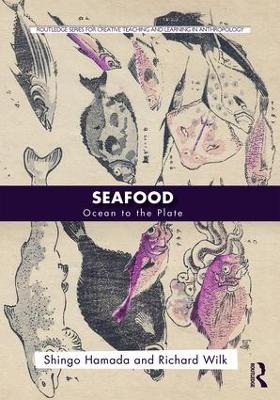
Seafood
Routledge (Verlag)
978-1-138-19187-7 (ISBN)
Seafood is an ideal book for courses on food and culture, economic anthropology, and the environment.
Shingo Hamada is Associate Professor of Food Studies at the Faculty of Liberal Arts at Osaka Shoin Women’s University. His research revolves around the environmental history and cultural politics of seafood in coastal Japan, with a special focus on fermented seafoods and commoners’ fish such as herring. He is the author of "The Future of Food Studies" in Food, Culture & Society, "Gone with the Herring: Ainu Geographic Names and a Multiethnic History of Coastal Hokkaido" in Canadian Journal of Native Studies. Richard Wilk is Provost’s Professor of Anthropology and Co-director of the Food Studies program, Distinguihsed Professor, and Provost's Profesor Emeritus at Indiana University, and former president of the Society for Economic Anthropology. His publications include more than 160 papers and book chapters, and monographs including Home Cooking in the Global Village: Caribbean Food from Buccaneers to Ecotourists, which was the winner of the Society for Economic Anthropology Annual Book Prize 2008. He has collaborated with both domestic and international scholars for several edited volumes, such as Fast Food/Slow Food: The Cultural Economy of the Global Food System and Rice and Beans: A Unique Dish in a Hundred Places (co-edited with Livia Barbosa). He is also co-editing with Josiah Heyman the Globalization and the Environment book series from Altamira Press, and, with Frank Trentmann, the Consumption and Public Life series from Palgrave/Macmillan, and he has co-edited several textbooks and readers, including The Environment in Anthropology: A Reader in Ecology, Culture, and Sustainable Living (co-edited with Nora Haenn), and The Anthropology of Media: A Reader (co-edited with Kelly Askew). His textbook co-written with Lisa Cliggett, Economies and Cultures, is in its second edition and has been translated into six languages.
Series Forward
Acknowledgments
Prologue: Why Study Seafood?
Chapter 1: Fish as Food: Healthy and Dangerous
Chapter 2: The Environmental History of the Sea and Seafood
Chapter 3: Tragedy or Treasury: Managing Fisheries
Chapter 4: Industrialization, Markets and Globalization
Chapter 5: Fish Transformers: the Rise of the Krabmeat
Chapter 6: Feeding Our Appetites and Tastes
Chapter 7: Seafood Ethics: Eating and Entertainment
Chapter 8: Eco-labeled Seafood: Social Justice or Cooptation?
Postscript: Preparing and Eating Seafood
Glossary of fish names
| Erscheinungsdatum | 13.03.2017 |
|---|---|
| Reihe/Serie | Routledge Series for Creative Teaching and Learning in Anthropology |
| Zusatzinfo | 1 Tables, black and white; 39 Halftones, black and white; 39 Illustrations, black and white |
| Verlagsort | London |
| Sprache | englisch |
| Maße | 178 x 254 mm |
| Gewicht | 280 g |
| Themenwelt | Naturwissenschaften ► Biologie ► Ökologie / Naturschutz |
| Sozialwissenschaften ► Ethnologie | |
| Sozialwissenschaften ► Soziologie | |
| Technik ► Lebensmitteltechnologie | |
| Technik ► Umwelttechnik / Biotechnologie | |
| Weitere Fachgebiete ► Land- / Forstwirtschaft / Fischerei | |
| ISBN-10 | 1-138-19187-6 / 1138191876 |
| ISBN-13 | 978-1-138-19187-7 / 9781138191877 |
| Zustand | Neuware |
| Haben Sie eine Frage zum Produkt? |
aus dem Bereich


